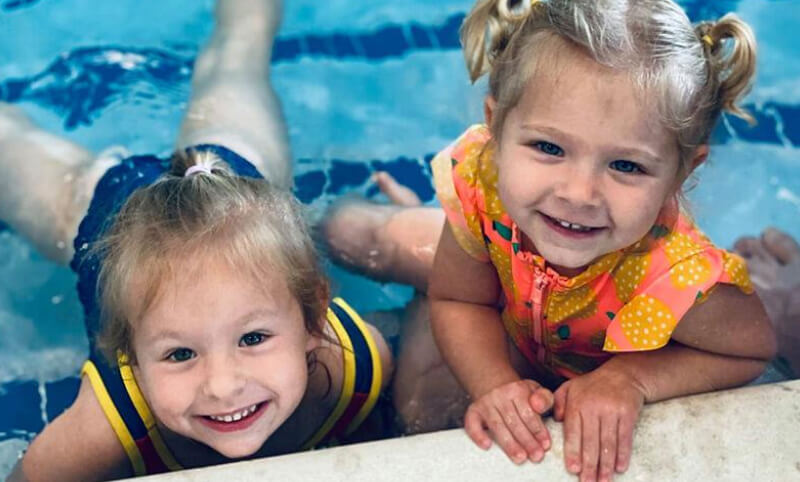Positive thinking is all about reframing your thoughts with an optimistic attitude. Pro athletes have used the philosophy of positive thinking for decades. It’s also a philosophy that we embrace at Njswim to help our students reach new ‘depths’ in the pool by learning to swim.
The Negative Thinking Trap
When learning any new skill, it can be easy to fall into the trap of negative thinking. Think back to a time when you tried to master something new. How many times did negative thoughts creep in? Times where you found yourself thinking “I’m not good enough” or “I’ll never get this”.
It can be hard to keep negative thoughts at bay. Especially when learning a challenging new skill. The same can happen to children when learning how to swim. For many children, trying to learn an activity can be intimidating.

But luckily there’s a power among us to keep negative thinking away. Positivity.
Positive thinking can transform any learning experience.
We’ve broken down the power of positive thinking and why it’s so important.
Positivity Can Drive Greatness
With any sport, but with swimming in particular, training and practicing only get you so far. Your mindset plays a key role in your determination and success.
Having a positive attitude helps us approach new challenges with confidence rather than fear. Positivity has the power to keep us pushing forward into the next paddle, paddle, pop.
Bill Cowher, Head Coach for the Pittsburgh Steelers from 1992-2006 said it best.
“Confidence is a very fragile thing and is something that has to start with your mental approach and your ability to respond and stay focused and not allow negative thoughts to enter into your own mind. ”
Coach Cowher taught his athletes that success comes first from a positive outlook. Outweighing negative thoughts with positive ones can boost your motivation and performance.
Replace negative thoughts like “I’ll never get this”, with “this will take time, but I won’t quit”.
Being Positive Is Good for You
Positivity goes further than affecting your performance. Studies prove positivity can also affect our health.
A recent study from Johns Hopkins has proven that positive people are one-third less likely to experience heart attacks. And negative thinking people are far more likely to experience health concerns overall.

Positive attitudes are also linked to the reduction of stress and anxiety. As well as the improvement of our immune systems.
Additionally, positivity helps us recover quicker and stronger from many conditions and injuries. These can range from a common cold to a traumatic brain injury.
In fact, the medical evidence on the power of positivity is overwhelming. Which makes one thing clear. Positivity goes beyond inspiring kids to do their best in the pool. It has a very real and strong effect on their future health.
Kids Respond Well to Positivity
Positive thinking can be difficult for some adults and they may need development and practice. But did you know that for many kids, it’s easy for them to ‘think positive’?
Studies have shown that children as young as five can understand the principles of positivity and its benefits. In fact, children who practice positive thinking develop more resilience in mind and body. They understand how to take negative setbacks without getting discouraged.
Studies show that positive-thinking children are 50% less likely to develop depression. A staggering statistic for parents to consider.
Picking Up on the Positive
You may be wondering, “How do I get my kids to practice positive thinking”? Kids are observant. They pick up on what is going on around them. A great way to give them a positive outlook is to have them spend time around adults who do the same.

If you fall into the positive category, try thinking out loud when around your kids. If you’re having trouble doing a task, talk positively to yourself. We know this is hard when something is not going your way but try your best. The best way to teach kids is by example.
For instance, reframing thoughts is key for a discouraged child. Say they failed a test. Thinking “I’ll change the way I study next time” is better than “I’m so stupid, I’ll never learn this”.
We can encourage our kids to reframe their thoughts when facing failure. This gives them armor for future conflicts.
Embracing the Power of Positivity at Njswim
Learning how to swim isn’t always about becoming the next Michael Phelps. It’s about understanding skills that will keep you safe your entire life. It’s also about having fun, letting go, and taking a leap.

At Njswim, a major part of our curriculum is positive thinking. Our Njswim culture aims to instill in kids the self-confidence they need in and out of the water. Our swimming lessons offer children the opportunity to enhance social development through swimming while promoting their health and wellness.
But we also believe that positive attitudes are a necessary part of life. Some of the tools we use can be an effective way to promote positivity to your kids both in the pool and out.
Read over some of these powerfully positive tips and let us know about the changes you start to see in your family.
Tip: Reframing
Reframing your thoughts is key to keeping your focus. This also helps us focus on things we can control over things we cannot. Instead of thinking “I will never get this”, try “this will take time, but I will not quit”.
Tip: Visualization
Visualization is a powerful tool used to reach our goals. Once a child sees themselves accomplishing something, their bodies respond to that motivation. Visualization helps to stay on task and keep working hard to reach that goal.
Tip: Allow Room for Improvements
Michael Phelps didn’t dive into the pool and become an Olympic swimmer overnight. In fact, he had many failures to get past. The key to getting past failures, is to accept them.
Accepting the fact that you will have bad performances is key to not getting discouraged. Instead of getting mad about not wanting to jump in the pool, your child should think, “How can I improve for the next swim class”.
If you’re interested in learning more about our programs, contact us today. Each one of our six locations throughout New Jersey are committed to providing our students with safe, supportive, and positive swimming experiences.




